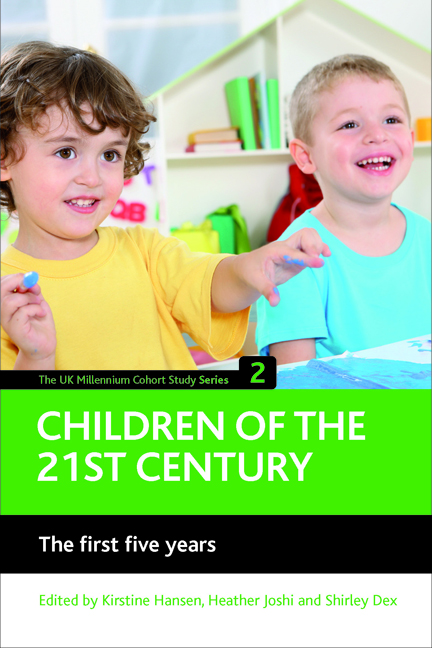Book contents
- Frontmatter
- Contents
- Acknowledgements
- List of contributors
- Glossary
- one Introduction
- two Child poverty in the first five years of life
- three Ethnicity, community and social capital
- four Parental relationships and parenting
- five Partnership trajectories, parent and child well-being
- six Employment trajectories and ethnic diversity
- seven Neighbourhoods and residential mobility
- eight Childcare in the pre-school years
- nine Intergenerational inequality in Early Years assessments
- ten Ethnic inequalities in child outcomes
- eleven School choice
- twelve Teacher assessments in the first year of school
- thirteen Childhood overweight and obesity
- fourteen Resilience in children's development
- fifteen Parental and child health
- sixteen Conclusions
- References
twelve - Teacher assessments in the first year of school
Published online by Cambridge University Press: 01 September 2022
- Frontmatter
- Contents
- Acknowledgements
- List of contributors
- Glossary
- one Introduction
- two Child poverty in the first five years of life
- three Ethnicity, community and social capital
- four Parental relationships and parenting
- five Partnership trajectories, parent and child well-being
- six Employment trajectories and ethnic diversity
- seven Neighbourhoods and residential mobility
- eight Childcare in the pre-school years
- nine Intergenerational inequality in Early Years assessments
- ten Ethnic inequalities in child outcomes
- eleven School choice
- twelve Teacher assessments in the first year of school
- thirteen Childhood overweight and obesity
- fourteen Resilience in children's development
- fifteen Parental and child health
- sixteen Conclusions
- References
Summary
Introduction
Children's development in the early years has been shown to be related to their success in later life in a range of areas including: education, employment, and avoiding crime and early parenthood (see Carneiro and Heckman, 2003; Feinstein and Duckworth, 2006). Determining why some children do better than others in the early years is a key issue for policy and is crucial in attempts to reduce inequalities. This chapter examines differences in Millennium Cohort Study (MCS) children's achievements at age 5 as rated by teachers. These teachers’ assessments provide another view of MCS children's development at age 5, complementary to the cognitive and behavioural development indicators described in Chapters 9, 10 and 14 in this volume. In some cases, the teachers’ assessments provide information for children who did not do the cognitive assessments that were part of the MCS 3 instruments, so this is an additional benefit of Foundation Stage Profiles (FSPs).
FSP and devolved administration teacher surveys
In state schools in England, teachers record the performance of pupils during the first year of school to produce FSP scores. These scores were collected by the Department for Children, Schools and Families (DCSF) for cohort members in state schools in England and linked to the survey data. Of 9,084 MCS children, 8,671 were successfully matched to their FSP scores. This constitutes a success rate of around 95%. Data were linked by fuzzy matching on: first name; gender; date of birth; child's home postcode; school establishment number; and surname. However, for children in Northern Ireland, Scotland and Wales, where FSP data were not routinely available, the information was collected by asking the same questions to the teachers in a postal survey. The response rate to this teachers’ survey was 68% but this rate varied by country, being highest in Northern Ireland, with a response rate of 73%, and lowest in Wales, with a response rate of 63%. For the rest of this chapter the data will be collectively referred to as FSP scores. There is only a low coverage of children attending private schools in England (around 5% of the sample in England) unless these schools voluntarily submit their scores to the local education authority (LEA).
- Type
- Chapter
- Information
- Children of the 21st century (Volume 2)The First Five Years, pp. 201 - 216Publisher: Bristol University PressPrint publication year: 2010



